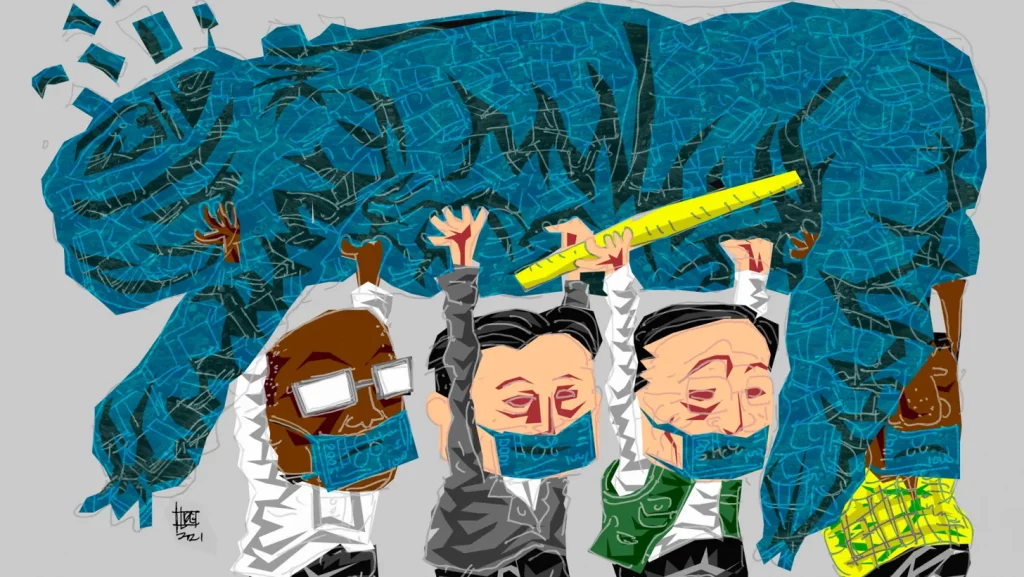Excerpt from the InDi
THE IMPACT OF CORRUPTION
Corruption-related misconduct causes massive economic and humanitarian loss, impacting transportation, telecommunication, healthcare, sanitation, energy, schools, and more – all vital to growth, social welfare and a healthy thriving society – and disproportionately impacts poorer and marginalized citizens. According to some estimates, we suffer between $3.6 and $4.5 trillion in economic loss from global corruption – approximately 5% of global GDP.2
Some interesting examples:
- One in five people worldwide report having paid a bribe to access a public service.3
- 4 in 10 European citizens believe corruption has risen in their country over the past three years (2020 – 2023) and describe it as widespread.4
- 124 countries are stagnant in their efforts to combat corruption.5
Corruption often thrives during times of crisis, particularly when institutions and oversight are weak or their focus diverted, and public trust is low. Indeed, exacerbated by the global pandemic and conflict in Eastern Europe and Gaza, the world’s economies continue to be stretched and government services overwhelmed. In addition, nationalism is reportedly expanding and rising globally6 and where governments utilize nationalist rhetoric to stay in power, experts believe the public sector is more corrupt.7 Global inflation has not fully abated and only more recently has our supply / demand balance begun to stabilize. At the same time, governments are issuing debt at a higher rate; for example, the US alone will issue $4T in 2024 bonds – $1T more than in 2023.` Collectively, these conditions expose cracks in our most critical global industries serving the most basic of human needs – access and support for critical infrastructure, healthcare, the environment, our global supply chain, technology, and defense to name just a few, allowing opportunity for corruption to thrive.

To better appreciate corruption’s impact, let us look closer at two areas with heightened focus in our world today: healthcare and the environment.
Healthcare. Transparency International estimates that of the $7.5 trillion spent globally on healthcare each year, $500 billion (nearly 7%) is lost to corruption across all five dimensions of the healthcare ecosystem: equity, quality, responsiveness, efficiency, and resilience. This represents more than what we need (~$370 billion) to provide every citizen on the planet with access to healthcare.8 Corruption in healthcare “kills an estimated 140,000 children a year, fuels the global rise in antimicrobial resistance, hinders the fight against HIV/AIDS and has hampered the ability to respond to COVID-19.”9 Countries with high levels of corruption spend less on healthcare as a percentage of GDP and experience poor health-related outcomes: higher infant and child mortality rates, lower life expectancy and immunization rates, and higher rates of antibiotic resistance.10
As governments injected additional funding into healthcare systems to cope with the global pandemic and further increased spending is projected,11 these large outflows of money need oversight, transparency, and monitoring through analytics running at scale from governments and private actors to ensure funds are not lost to corruption.
Environment. Corruption encourages the over-exploitation of forests, fisheries, and farmlands without considering the long-term impact this exploitation has on livelihoods and the sustainability of the environment. Similarly, corruption negatively impacts water supplies, natural resources, and hazardous waste management.
For example, the World Bank estimates corruption increases the cost of water infrastructure by as much as 40% – this equates to an additional $12 billion a year needed to provide worldwide safe drinking water and sanitation.12 In individual households, corruption is estimated to increase the price of obtaining a water connection by as much as 30%.13
The now familiar Brazilian Car Wash Scandal implicated several Amazon mega-dams, including $24 million paid in bribes relating to the Belo Monte dam and a guilty verdict against a construction consortium executive for corruption and money laundering. Constructing just one dam displaced and increased the vulnerability of indigenous and local people as it dried up the Xingu River, flooded islands and lagoons, killed fish, extinguished some of the world’s most diverse habitats such as croplands and rainforests (include 175 miles of the Amazon), and produced more yearly greenhouse gases than Sao Paulo, Brazil’s largest city.14
With urgency, the world is working to accelerate ways to reduce and reverse the impact of climate change and preservation of our planet – all likely to lead to increased private, NGO, and government spending aimed at many of the most corrupt countries in the world according to the Corruption Perception Index.15
Click here to read the entire article.
About the Authors

Vincent M. Walden, CFE, CPA, is CEO of Kona AI, a global, AI-driven software company focused on anti-fraud, anti-corruption and compliance risks. He specializes in forensic data analytics, corporate compliance and white-collar crime. Recognized as CFE of the Year in 2022 by the Association of Certified Fraud Examiners, Mr. Walden has over 25 years of professional anti-fraud and forensic technology experience focused on providing leading technology innovations on both proactive compliance programs and reactive investigations to Fortune 500 companies. He welcomes your feedback and ideas. Contact Walden at vwalden@konaai.com.
Jeannine Lemker is a University of Washington School of Law Assistant Professor, Director of the Entrepreneurial Law Clinic, and Co-Director for the law school’s Global Business Law Institute. Prior to joining the faculty, Jeannine was a Managing Director at Major, Lindsey & Africa. She spent 10 years as a senior member of Meta and Microsoft’s Compliance and Ethics programs, leading diverse teams who designed and landed culture and controls programs and strategies, data analytics programs, enterprise risk management, emerging regulatory compliance risk management, ESG / human rights, and corporate compliance programs. In her first ten years of practice, Jeannine was a white-collar criminal defense attorney at Cadwalader, Wickersham & Taft LLP. She is a Board member of Integrity Distributed, an MIT affiliated non-profit seeking to democratize compliance analytics, an advisor to Ethena, a women-led start-up revolutionizing corporate training, and member of several athletic organization non-profit Boards. She holds a JD from Georgetown University Law Center and a BA from George Washington University.






